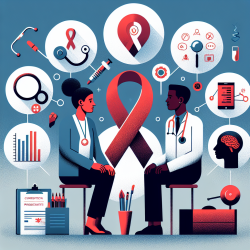Introduction
Gender-based violence (GBV) is a pervasive issue affecting key populations such as female sex workers, men who have sex with men (MSM), and transgender women, particularly in regions like Latin America and the Caribbean. A recent study published in BMC International Health and Human Rights sheds light on the experiences of these groups, providing crucial insights for practitioners aiming to improve outcomes for these vulnerable populations.
Key Findings
The study, which utilized a participatory approach involving 278 structured interviews, revealed that nearly all participants experienced some form of GBV. Emotional and economic violence were most commonly reported, with significant instances of sexual and physical violence. These experiences occurred in various settings, including homes, public spaces, and healthcare centers, with perpetrators ranging from family members to police officers.
Implications for Practitioners
For practitioners, these findings underscore the importance of integrating GBV awareness and response strategies into HIV programming. Here are some actionable steps:
- Training and Sensitization: Healthcare providers and law enforcement should undergo training to recognize and respond appropriately to GBV, ensuring a supportive environment for victims.
- Service Integration: Develop integrated services that address both GBV and HIV, providing comprehensive care that considers the unique needs of key populations.
- Community Engagement: Work with community organizations to create safe spaces and support networks for individuals affected by GBV, fostering resilience and empowerment.
Encouraging Further Research
While this study provides valuable insights, further research is needed to explore the long-term impacts of GBV on health outcomes and to develop tailored interventions. Practitioners are encouraged to collaborate with researchers and community organizations to continue this important work.
Conclusion
Addressing GBV is crucial for improving health outcomes and protecting the human rights of key populations. By integrating GBV awareness into programming and encouraging further research, practitioners can make significant strides in supporting these vulnerable groups.
To read the original research paper, please follow this link: Experiences of gender-based violence among female sex workers, men who have sex with men, and transgender women in Latin America and the Caribbean: a qualitative study to inform HIV programming.










